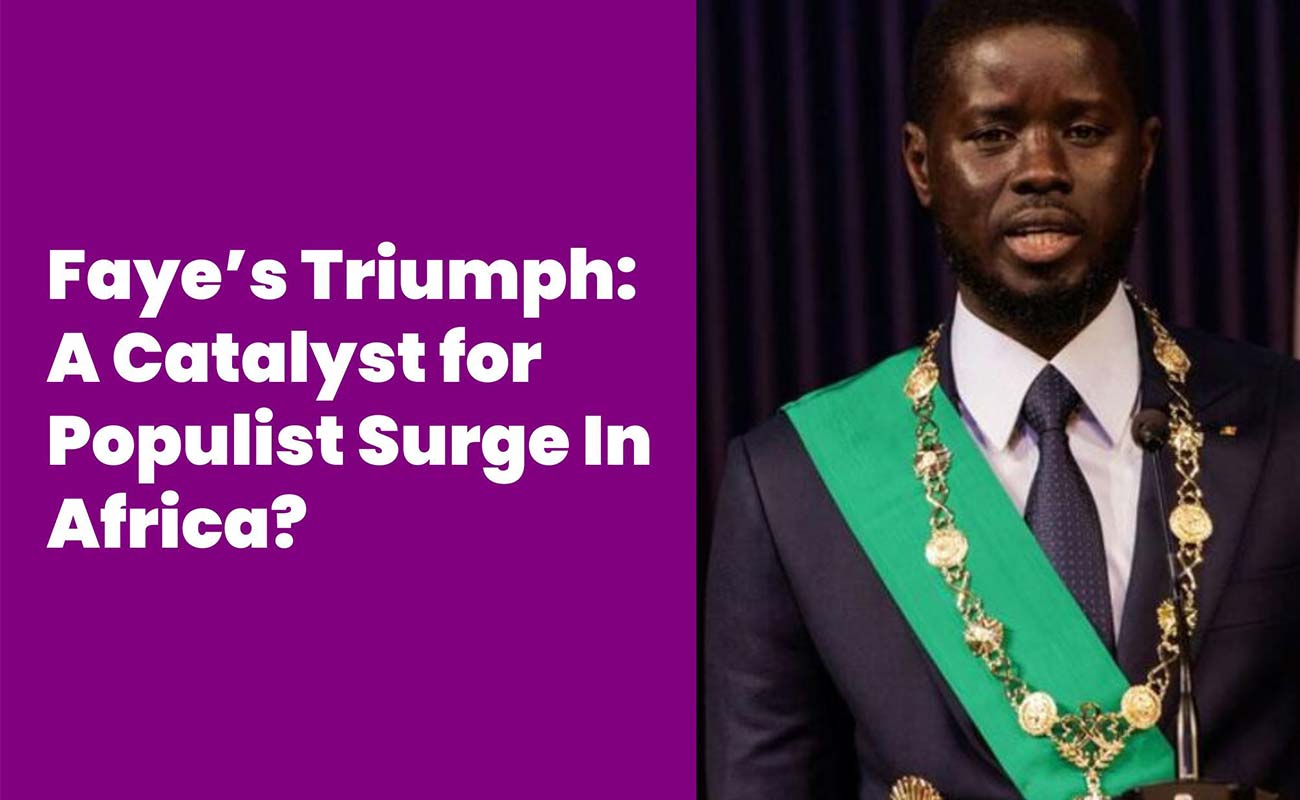
By Chidinma Nebolisa
March 2024 marked a historic moment in Senegal’s political landscape as Bassirou Diomaye Faye ascended to the presidency, becoming Africa’s youngest leader. From Macky Sall’s postponement to Faye’s landslide victory, the Senegalese election saga has been one for the books, captivating global attention. Many attribute his victory to his “radical” campaign ideologies, which resonated deeply with a populace yearning for change, earning him “anti-establishment” and “left-wing populist” connotations.
Faye’s win holds particular significance in West Africa and the ECOWAS bloc, where military juntas have threatened democratic stability. Against the backdrop of a global surge in populist movements, notably in North America, Latin America, and Europe, one cannot help but question the possibility that Faye’s victory could spark a resurgence of populism in Africa, shaping a new political narrative for the region.
Populism, characterized by charismatic leaders voicing the will of the people, often creates an “Us vs Them” dynamic, vilifying elites as the source of societal problems. Populism is usually combined with other political ideologies that produce the left-wing and right-wing populists. Commonly found in Latin America, the former stands strongly against foreign interest from countries and multinationals, tolling towards the establishment of radical economic policies to address economic marginalization and abolish tenets of capitalism. The latter, which is prevalent in the West stands against foreign individuals, such as immigrants and refugees.
While commonly associated with other regions, populism is not foreign to Africa. The continent has seen prominent populist leaders like Ghana’s Jerry John Rawlings, Zambia’s Michael Sata, Uganda’s Yoweri Museveni, and Kenya’s Raila Odinga, amongst a few, each employing unique strategies tailored to the African context. African populists forge direct connections with the people through local languages, proverbs, and narratives, presenting themselves as champions of the marginalized. To portray a character like the marginalized, they often articulate a “humble background”, alienating themselves from the demonized elites. In a few instances, they emerged after coups, framing their ascent as a social revolution transferring power from elites to the people.
The appeal of populism amongst African nationals lies in its promise to address pressing issues such as poverty, unemployment, and perceived foreign interference, making it an attractive ideology to rising African political leaders. In the case of Senegal, the campaign policies of the 44-year-old leader focused on enforcing radical changes through anti-corruption measures, national sovereignty, and foreign economic reforms, which resonated strongly with Senegalese voters, who are disillusioned with the issues of the previous administration.
As Africa grapples with economic challenges, youth unemployment, political exclusion, and governance issues, the allure of populist leaders addressing these concerns is undeniable. With upcoming elections in several African nations, a populist surge inspired by Faye’s victory is conceivable, especially in countries with histories of populist leadership.
South Africa’s political landscape exemplifies this trend. Jacob Zuma’s eligibility to rerun under the uMkhonto weSizwe (MK) party, has created mixed reactions in the country. Frustrated by the economic and unemployment crisis, as well as corruption allegations against Cyril Ramaphosa’s African National Congress (ANC), many have predicted that the ANC could secure less than half of the votes. This has placed the spotlight on opposition parties including Zuma’s MK, which though has not publicized its manifesto, leans towards right-wing populist rhetorics.
Similarly, South Africa’s third largest party, Julius Malema’s left-wing populist Economic Freedom Fighters, is set to garner more support, given the disappointments with the ANC regime. The left-wing populist leader proposes economic nationalization policies on banks and mines to alleviate foreign dominance in South Africa.
Additionally, opinions of the upcoming 2024 election in Tunisia speculate that Kais Saied, a right-wing populist with authoritarian tendencies, could secure re-election. Despite criticisms of his autocratic style and the setback to the country’s progress since the Arab Spring, some argue that Saied’s leadership, though harsh, represents an improvement over past administrations.
Faye’s recent victory in Senegal prompts a crucial discussion on the potential rise of populism across Africa. While populism presents itself as a solution to pressing issues, it also brings inherent risks of authoritarianism or eventual failure, as seen in present African populist leaders like Rwanda’s Paul Kagame and Kenya’s William Ruto. One of the key challenges with populism is the stark contrast between campaign promises and the realities of governance. Some leaders struggle to implement their campaign policies upon realizing the complexities of governance or recognizing the value of previous administrations’ condemned policies. Others merely use populist rhetoric without genuine intent, while a third group enforces their policies with an authoritarian grip.
As African nations navigate political landscapes, heightened awareness and informed decision-making are crucial to steer any emerging populist movements towards constructive outcomes for the continent and its people.
